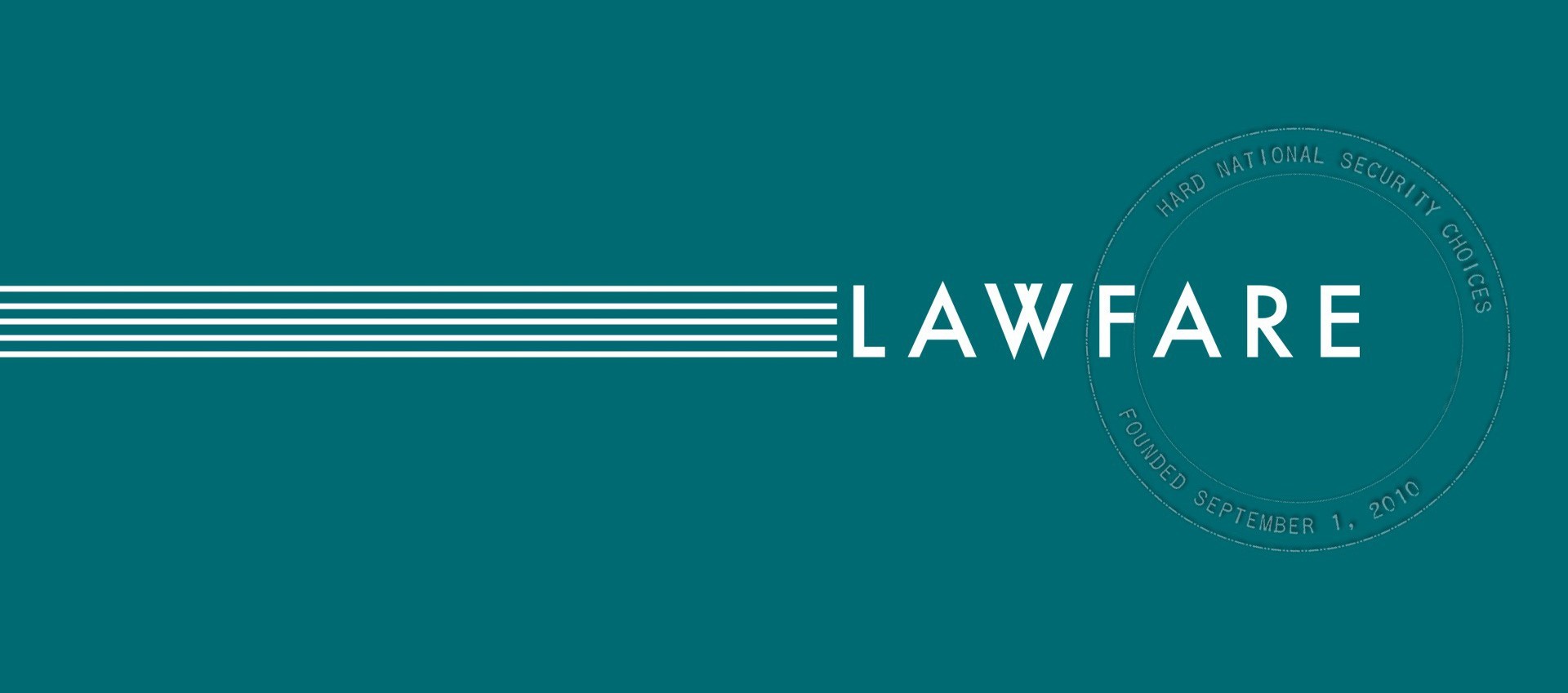The Week That Was: All of Lawfare in One Post
Your weekly summary of everything on the site.

Published by The Lawfare Institute
in Cooperation With

Subscribe to receive this newsletter directly to your inbox.
Hyemin Han shared two orders from U.S. District Judge Aileen Cannon: one appointing U.S. District Judge for the Eastern District of New York Raymond J. Dearie to the position of special master to oversee privilege claims in the materials seized at Mar-a-Lago on Aug. 8, and another rejecting the Justice Department’smotion for partial stay of Cannon’s order enjoining the government from using materials seized at Mar-a-Lago in its ongoing investigation.
Katherine Pompilio shared the Justice Department’s response to former President Donald Trump’s objection to the government’s motion for partial stay.
Han shared Trump’s response to the Justice Department’s motion for partial stay of U.S District Judge Aileen Cannon's order enjoining the government from using the materials seized at Mar-a-Lago for criminal investigative purposes.
Quinta Jurecic hosted a live event on Twitter Spaces to discuss Judge Cannon’s ruling with Benjamin Wittes, Alan Rosenshtein, and Scott Anderson.
Peter Feaver and Michèle Flournoy wrote that an open letter published in War on the Rocks shows a remarkable consensus on what core principles of civil-military relations are necessary for maintaining the rule of law and argues that both civilians and the military need to participate in upholding these ideals.
Brian Fishman assessed the realities of “holding big tech accountable,” proposing four principles to guide lawmakers as they open the messy and unsatisfying Pandora’s box of tech regulation.
David Priess shared an episode of the Chatter Podcast in which Priess and Ric Prado discussed Prado’s extensive experience in the CIA and misconceptions about intelligence agencies as portrayed in Hollywood.
Brady Worthington analyzed a report released on Aug. 31 by the United Nations Office of the High Commissioner for Human Rights on the “crimes against humanity” committed by the Chinese government against Uyghur populations in Xinjiang.
Gabriel Band explored the roles and unintended consequences of sanctions employed by the U.S. in influencing opposing foreign political agendas, using U.S. sanctions against Russia and Iran as examples.
Jen Patja Howell shared an episode of the Lawfare Podcast in which Benjamin Wittes and Dmitri Alperovitch sat down to discuss Ukraine’s offensive strategy in Kharkiv Oblast, Russia’s ability to sustain the war, and the likelihood of Ukrainian economic collapse.
Jen Patja Howell shared an episode of the Lawfare Podcast in which senior editor Quinta Jurecic spoke with Lawfare editor-in-chief Benjamin Wittes and contributing editor Paul Rosenzweig about Ken Starr, the former federal judge and independent counsel who became famous for his investigation of President Bill Clinton, who died this week on Sept. 13 at age 76.
Howell shared an episode of the Lawfare Podcast in which Tia Sewell spoke with Todd Huntley and Marc Garlasco about the Department of Defense’s newly released Civilian Harm Mitigation and Response Action Plan
Elizabeth Lee, Jonathan Schroden, and Heather Wolters discussed how to adapt special operations forces leadership styles to better meet the needs of younger generations within the forces.
Pompilio also shared U.S. District Judge Donald M. Middlebrooks’ ruling dismissing former President Donald Trump’s lawsuit against Hillary Clinton and others in which he alleged that the accused were responsible for intentionally spreading malicious disinformation about the validity of his campaign and personhood.
Jessica Bulman-Pozen and Miriam Seifter highlighted the important role that state constitutions can and should play in protecting free and fair elections and limiting voter suppression.
Daniel Richman reviewed Michelle Wilde Anderson’s new book, “The Fight to Save the Town: Reimagining Discarded America” Simon & Schuster, 2022).
Kristen Eichensehr and Cathy Hwang examined the extension of federal government involvement and intervention in cross-border investments under the pretense of national security. Eichensehr and Hwang argue for transparency from countries engaging in this “national security creep.”
Herb Lin analyzed the threat quantum computing poses to national security. Assuming quantum computing will eventually be able to decrypt the internet’s most secure encryption algorithms, Lin suggested that governments and entities with secrets form contingency plans in the case of leaks of confidential information.
Howell shared an episode of the Lawfare Podcast in which Scott R. Anderson sat down with Leigh Baldwin and Sean Williams to discuss Vladimir Putin’s history of involvement in communist intelligence agencies and far-right German movements.
Howell shared an episode of Rational Security in which Alan Rozenshtein, Quinta Jurecic, Scott R. Anderson, and Dana Stuster discussed this week’s national security news. The team discussed the recent Russian retreat in Ukraine, Cloudflare’s decision to stop providing security services to Kiwi Farms, the death of Queen Elizabeth II, and more.
John Bellinger, Sean Mirski, and Catherine McCarthy examined the U.S. District Court for the Eastern District of Missouri’s dismissal of a series of civil lawsuits filed against the People’s Republic of China for allegedly causing the coronavirus pandemic.
Jordan Schneider shared an episode of ChinaTalk in which he spoke to Paul Kennedy about the late historian Jonathan Spence.
Brian Harding and Haroro Ingram argued that the recently elected President Ferdinand Marcos Jr. in the Philippines and the potential peace efforts in the Bangsamoro region provide an opportunity for the U.S. to secure an alliance with the Philippines.
Howell shared an episode of the Lawfare Podcast in which David Priess sat down with Erin Sikorsky to discuss the impact of the floods in Pakistan on Pakistani military relief, security services, and climate change response.
Howell shared an episode of the Lawfare Podcast in which Sewell sat down with Rupert Stone to discuss the relationship between the Taliban and Afghanistan’s illicit drug trade.
Priess shared the latest edition of Chatter featuring a discussion with Kevin Bryant on his new book about spying tactics in the NFL.
And that was the week that was.




